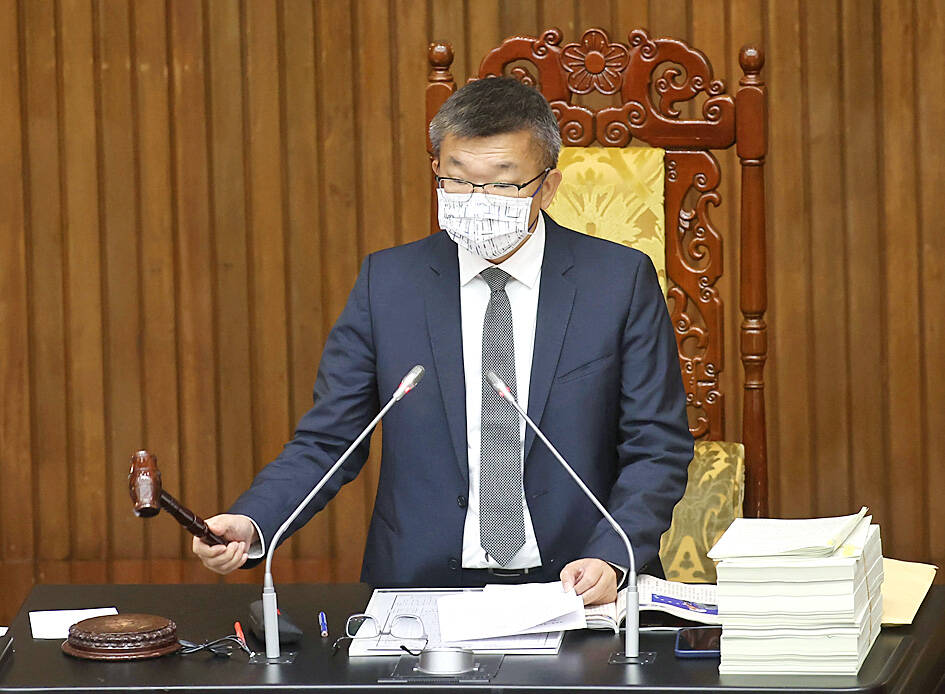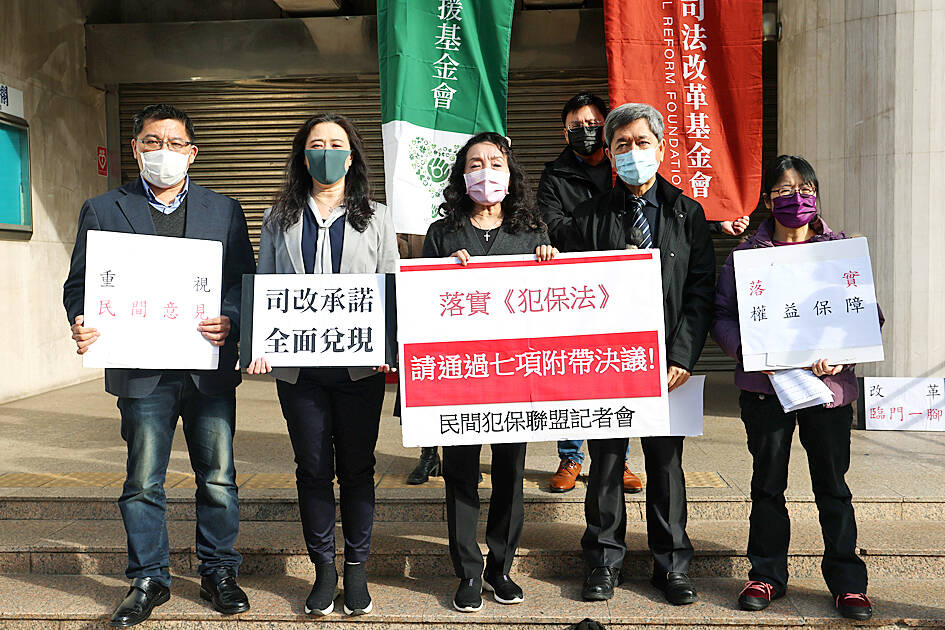The legislature yesterday passed draft amendments to curb the use of sexual images and video that would make the production and spread of fake or manipulated images and video for profit a crime punishable by up to seven years in prison.
The draft amendments to the Criminal Code include an additional article dedicated to a new form of crime using artificial intelligence — deepfakes — which involve inserting the likeness of a person into an existing image or video.
The draft amendments were proposed after the arrest in 2021 of a Taiwanese YouTuber for making and selling “deepfake” pornographic videos of dozens of prominent women, including politicians.

Photo: CNA
The approved legislation includes a provision stipulating that producing sexual material involving images or video footage of another individual without that person’s consent is subject to a maximum sentence of three years in prison, while the unauthorized distribution of such material could result in a prison term of six months to five years.
Anyone found guilty of distributing such content for profit faces an additional sentence of up to one half of the prescribed sentence, the amendment states.
The bill also includes a provision that anyone convicted of producing sexual images or video of another individual through the use of threats or violence faces up to five years in prison and one to seven years if distribution is involved.

Photo: CNA
Without the consent of the party involved, those who reproduce, distribute, broadcast, deliver, display or use other methods to display sexual images of others would be subject to a maximum sentence of five years in prison and a fine of up to NT$500,000 (US$16,289).
The draft also stipulates that those who produce or disseminate deepfakes face a sentence of up to five years in jail and, if the offense is profit-related, up to seven years.
Kaohsiung City Councilor Huang Jie (黃捷) said the passing of the law is the “best New Year’s gift” to victims of sexual exploitation, and thanked lawmakers for making it happen.
The law could be improved with regard to curbing “digital sexual violence,” including by creating mechanisms to immediately remove illegal images and video from Internet platforms, she added.
Lawmakers also passed a third reading of amendments to the Crime Victim Protection Act (犯罪被害人權益保障法).
The amendments expand the protections offered to victims of new forms of crime, including revenge porn and secretly filmed sexual content.
The changes authorize judicial authorities to impose restraining orders against suspects for up to two years during the trial period.
Compensation for next of kin in manslaughter or murder cases would be set at NT$1.8 million, while victims of crimes resulting in severe injuries would receive NT$800,000 to NT$1.6 million, and victims of sexual assault would receive NT$100,000 to NT$400,000.
New Power Party Legislator Claire Wang (王婉諭) said that “this amendment has … expanded the social safety net for victims of crime, including more programs to better protect the victims.”
“However, government agencies must allocate consistent, long-term funding. If not, these are merely administrative orders, without actual legal enforcement,” she said, adding that the current funding is insufficient.
Groups protested outside the Legislative Yuan, including representatives from the Association for Victims Support, the Judicial Reform Foundation, the Taipei Women’s Rescue Foundation and the Taiwan Children’s Rights Association.
Taiwan Children’s Rights Association founder Wang Wei-chun (王薇君) said that the changes do not go far enough.
“I especially cannot accept that lawmakers imposed a cap on the compensation for [murder] at NT$1.8 million. This is not sufficient for many families experiencing economic hardship,” she said.
Additional reporting by Jason Pan

‘WIN-WIN’: The Philippines, and central and eastern European countries are important potential drone cooperation partners, Minister of Foreign Affairs Lin Chia-lung said Minister of Foreign Affairs Lin Chia-lung (林佳龍) in an interview published yesterday confirmed that there are joint ventures between Taiwan and Poland in the drone industry. Lin made the remark in an exclusive interview with the Chinese-language Liberty Times (the Taipei Times’ sister paper). The government-backed Taiwan Excellence Drone International Business Opportunities Alliance and the Polish Chamber of Unmanned Systems on Wednesday last week signed a memorandum of understanding in Poland to develop a “non-China” supply chain for drones and work together on key technologies. Asked if Taiwan prioritized Poland among central and eastern European countries in drone collaboration, Lin

The Chien Feng IV (勁蜂, Mighty Hornet) loitering munition is on track to enter flight tests next month in connection with potential adoption by Taiwanese and US armed forces, a government source said yesterday. The kamikaze drone, which boasts a range of 1,000km, debuted at the Taipei Aerospace and Defense Technology Exhibition in September, the official said on condition of anonymity. The Chungshan Institute of Science and Technology and US-based Kratos Defense jointly developed the platform by leveraging the engine and airframe of the latter’s MQM-178 Firejet target drone, they said. The uncrewed aerial vehicle is designed to utilize an artificial intelligence computer

Renewed border fighting between Thailand and Cambodia showed no signs of abating yesterday, leaving hundreds of thousands of displaced people in both countries living in strained conditions as more flooded into temporary shelters. Reporters on the Thai side of the border heard sounds of outgoing, indirect fire yesterday. About 400,000 people have been evacuated from affected areas in Thailand and about 700 schools closed while fighting was ongoing in four border provinces, said Thai Rear Admiral Surasant Kongsiri, a spokesman for the military. Cambodia evacuated more than 127,000 villagers and closed hundreds of schools, the Thai Ministry of Defense said. Thailand’s military announced that

CABINET APPROVAL: People seeking assisted reproduction must be assessed to determine whether they would be adequate parents, the planned changes say Proposed amendments to the Assisted Reproduction Act (人工生殖法) advanced yesterday by the Executive Yuan would grant married lesbian couples and single women access to legal assisted reproductive services. The proposed revisions are “based on the fundamental principle of respecting women’s reproductive autonomy,” Cabinet spokesperson Michelle Lee (李慧芝) quoted Vice Premier Cheng Li-chiun (鄭麗君), who presided over a Cabinet meeting earlier yesterday, as saying at the briefing. The draft amendment would be submitted to the legislature for review. The Ministry of Health and Welfare, which proposed the amendments, said that experts on children’s rights, gender equality, law and medicine attended cross-disciplinary meetings, adding that